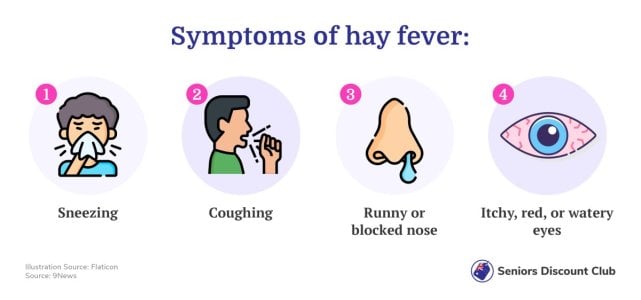Doctors issue warning as warm, hay fever season approaches
By
Danielle F.
- Replies 18
As the seasons shift, many Australians look forward to the warmer weather.
Yet, for a significant portion of the population, this time of year could bring a condition that may cause discomfort.
Medical professionals raised the alarm as hay fever season arrives ahead of schedule.
This could particularly affect individuals with asthma.
Hay fever, or allergic rhinitis, is a common ailment that impacts around 20 per cent of Australians.
Hay fever symptoms are often mistaken for a common cold.
However, hay fever is an allergic reaction to airborne substances like pollen, which are more prevalent during spring and summer.
This year's early arrival of hay fever season has been attributed to changing weather patterns, leading to an increase in pollen production.
This could be particularly problematic for individuals with asthma, as hay fever and asthma symptoms frequently overlap.
Bupa Clinical Director Dr Tony MacDermott emphasised the importance of vigilance during this period.
'If you're wheezing, experiencing shortness of breath, or a persistent cough, don't let that go unchecked,' Dr MacDermott stated.
'They are not typical hay fever symptoms; these may be signs of seasonal asthma.'
Asthma symptoms could be more severe, as they include chest tightness, faintness, or shortness of breath.
Apart from the discomfort these symptoms cause, these warnings also raised the potential strain on healthcare services.
'Prevention is the best way to manage asthma. It helps in taking pressure off ambulances and overcrowded public hospitals,' Dr MacDermott added.
With the proper precautions, individuals may manage their symptoms and minimise the need for emergency services.
For those experiencing symptoms, it is crucial to differentiate hay fever from asthma.
Visiting a general practitioner or a specialised clinic could give an accurate diagnosis and appropriate treatment.
For those diagnosed with asthma, always keep inhalers up-to-date.
Over-the-counter medicines like antihistamines could also provide temporary relief.
Keeping windows closed on high pollen days, wearing sunglasses to protect the eyes, and showering after staying outdoors to remove pollen could also help.
By taking preventative measures and seeking medical advice, everyone may enjoy the beauty of spring without the burden of allergies.

Did you notice the early start of hay fever season? How do you keep yourselves healthy during these changes in the weather? Share your health tips with us in the comments section below.
Yet, for a significant portion of the population, this time of year could bring a condition that may cause discomfort.
Medical professionals raised the alarm as hay fever season arrives ahead of schedule.
This could particularly affect individuals with asthma.
Hay fever, or allergic rhinitis, is a common ailment that impacts around 20 per cent of Australians.
Hay fever symptoms are often mistaken for a common cold.
However, hay fever is an allergic reaction to airborne substances like pollen, which are more prevalent during spring and summer.
This year's early arrival of hay fever season has been attributed to changing weather patterns, leading to an increase in pollen production.
This could be particularly problematic for individuals with asthma, as hay fever and asthma symptoms frequently overlap.
Bupa Clinical Director Dr Tony MacDermott emphasised the importance of vigilance during this period.
'If you're wheezing, experiencing shortness of breath, or a persistent cough, don't let that go unchecked,' Dr MacDermott stated.
'They are not typical hay fever symptoms; these may be signs of seasonal asthma.'
Asthma symptoms could be more severe, as they include chest tightness, faintness, or shortness of breath.
Apart from the discomfort these symptoms cause, these warnings also raised the potential strain on healthcare services.
'Prevention is the best way to manage asthma. It helps in taking pressure off ambulances and overcrowded public hospitals,' Dr MacDermott added.
With the proper precautions, individuals may manage their symptoms and minimise the need for emergency services.
For those experiencing symptoms, it is crucial to differentiate hay fever from asthma.
Visiting a general practitioner or a specialised clinic could give an accurate diagnosis and appropriate treatment.
For those diagnosed with asthma, always keep inhalers up-to-date.
Over-the-counter medicines like antihistamines could also provide temporary relief.
Keeping windows closed on high pollen days, wearing sunglasses to protect the eyes, and showering after staying outdoors to remove pollen could also help.
By taking preventative measures and seeking medical advice, everyone may enjoy the beauty of spring without the burden of allergies.
Key Takeaways
- Australians were warned about the hay fever season starting earlier this year.
- Doctors saw an increase in hay fever patients due to weather changes and an earlier pollen season.
- Bupa Clinical Director Dr Tony MacDermott advised those with asthma to be cautious of overlapping symptoms with hay fever.
- Those diagnosed with asthma were encouraged to check their inhalers and seek medical advice to manage their conditions during this season.









